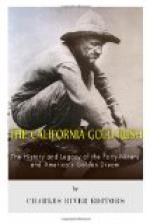Affairs moved very swiftly. A month was the unit of time. Nobody made bargains for more than a month in advance. Interest was charged on money by the month. Indeed, conditions changed so fast that no man pretended to estimate them beyond thirty days ahead, and to do even that was considered rather a gamble. Real estate joined the parade of advance. Little holes in sand-hills sold for fabulous prices. The sick, destitute, and discouraged were submerged beneath the mounting tide of vigorous optimism that bore on its crest the strong and able members of the community. Every one either was rich or expected soon to be so. Opportunity awaited every man at every corner. Men who knew how to take advantage of fortune’s gifts were assured of immediate high returns. Those with capital were, of course, enabled to take advantage of the opportunities more quickly; but the ingenious mind saw its chances even with nothing to start on.
One man, who landed broke but who possessed two or three dozen old newspapers used as packing, sold them at a dollar and two dollars apiece and so made his start. Another immigrant with a few packages of ordinary tin tacks exchanged them with a man engaged in putting up a canvas house for their exact weight in gold dust. Harlan tells of walking along the shore of Happy Valley and finding it lined with discarded pickle jars and bottles. Remembering the high price of pickles in San Francisco, he gathered up several hundred of them, bought a barrel of cider vinegar from a newly-arrived vessel, collected a lot of cucumbers, and started a bottling works. Before night, he said, he had cleared over three hundred dollars. With this he made a corner in tobacco pipes by which he realized one hundred and fifty dollars in twenty-four hours.
Mail was distributed soon after the arrival of the mail-steamer. The indigent would often sit up a day or so before the expected arrival of the mail-steamer holding places in line at the post-office. They expected no letters but could sell the advantageous positions for high prices when the mail actually arrived. He was a poor-spirited man indeed who by these and many other equally picturesque means could not raise his gold slug in a reasonable time; and, possessed of fifty dollars, he was an independent citizen. He could increase his capital by interest compounded every day, provided he used his wits; or for a brief span of glory he could live with the best of them. A story is told of a new-come traveler offering a small boy fifty cents to carry his valise to the hotel. The urchin looked with contempt at the coin, fished out two fifty-cent pieces, handed them to the owner of the valise, saying “Here’s a dollar; carry it yourself.”




